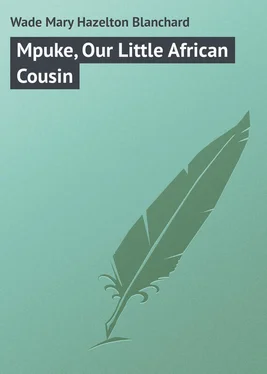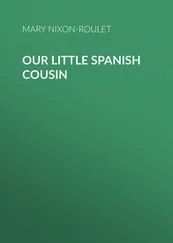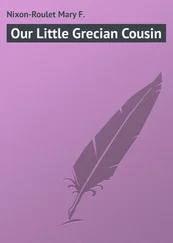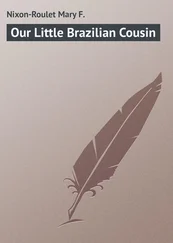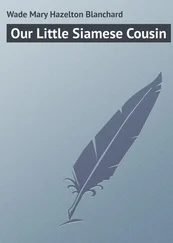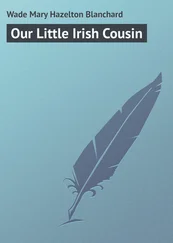Mary Wade - Mpuke, Our Little African Cousin
Здесь есть возможность читать онлайн «Mary Wade - Mpuke, Our Little African Cousin» — ознакомительный отрывок электронной книги совершенно бесплатно, а после прочтения отрывка купить полную версию. В некоторых случаях можно слушать аудио, скачать через торрент в формате fb2 и присутствует краткое содержание. Жанр: foreign_language, foreign_prose, на английском языке. Описание произведения, (предисловие) а так же отзывы посетителей доступны на портале библиотеки ЛибКат.
- Название:Mpuke, Our Little African Cousin
- Автор:
- Жанр:
- Год:неизвестен
- ISBN:нет данных
- Рейтинг книги:4 / 5. Голосов: 1
-
Избранное:Добавить в избранное
- Отзывы:
-
Ваша оценка:
- 80
- 1
- 2
- 3
- 4
- 5
Mpuke, Our Little African Cousin: краткое содержание, описание и аннотация
Предлагаем к чтению аннотацию, описание, краткое содержание или предисловие (зависит от того, что написал сам автор книги «Mpuke, Our Little African Cousin»). Если вы не нашли необходимую информацию о книге — напишите в комментариях, мы постараемся отыскать её.
Mpuke, Our Little African Cousin — читать онлайн ознакомительный отрывок
Ниже представлен текст книги, разбитый по страницам. Система сохранения места последней прочитанной страницы, позволяет с удобством читать онлайн бесплатно книгу «Mpuke, Our Little African Cousin», без необходимости каждый раз заново искать на чём Вы остановились. Поставьте закладку, и сможете в любой момент перейти на страницу, на которой закончили чтение.
Интервал:
Закладка:
Mary Hazelton Wade
Mpuke, Our Little African Cousin
Preface
FAR away, toward the other side of the round earth, far to the east and south of America, lies the great continent of Africa. There live many people strange to us, with their black skins, kinky, woolly hair, flat noses, and thick lips. These black people we call Africans or negroes, and it is a little child among them that we are going to visit by and by.
Different as these African people of the negro race are from us, who belong to the white race, they yet belong to the same great family, as we say. Like all the peoples of all the races of men on this big earth, they belong to the human family, or the family of mankind. So we shall call the little black child whom we are going to visit our little black cousin.
We need not go so far away from home, indeed, to see little black children with woolly, kinky hair and flat noses like the little African. In the sunny South of our own land are many negro children as like the little negro cousin in Africa as one pea is like another. Years and years ago slave-ships brought to this country negroes, stolen from their own African homes to be the slaves and servants of the white people here. Now the children and great-grandchildren of these negro slaves are growing up in our country, knowing no other home than this. The home of the great negro race, however, is the wide continent of Africa, with its deserts of hot sand, its parching winds and its tropical forests.
So, as we wish to see a little African cousin in his own African home, we are going to visit little black Mpuke instead of little black Topsy or Sammy, whom we might see nearer by.
It's away, then, to Africa!
CHAPTER I
THE BOY
ARE you ready for a long journey this morning? Your eyes look eager for new sights, so we will start at once for Mpuke's strange home. We will travel on the wings of the mind so as to cross the great ocean in the passage of a moment. No seasickness, no expense, and no worry! It is a comfortable way to travel. Do you not think so?
Yes, this is Africa. Men call it the "Dark Continent" because so little has been known of it. Yet it is a very wonderful land, filled with strange animals and queer people, containing the oldest monuments, the greatest desert, the richest diamond mines, in the world.
Some of the wisest people in the world once lived here. Large libraries were gathered together, thousands of years ago, in the cities of this continent.
Yet the little negro whom we visit to-day is of a savage race. He is ignorant of civilised ways and customs. He knows nothing of books and schools. I doubt if he even knows when his birthday draws near; but he is happy as the day is long; his troubles pass as quickly as the April showers.
Let us paint his picture. We must make his eyes very round and bright and black. The teeth should be like the whitest pearls. His head must be covered with a mass of curly black wool. His lips are red and thick, while his skin is black and shining. He is tall and straight, and has muscles of which any boy might well be proud. He is not bothered by stiff collars or tight shoes. He is not obliged to stay in the house when he has torn a hole in his stocking, or ripped his trousers in climbing a tree, because he does not own any of these articles of clothing.
From morning until night, and from night until morning again, he is dressed in the suit Mother Nature provided for him, – his own beautiful glossy skin. She knew well that in the hot land near the equator, where Mpuke was born, he would never feel the need of more covering than this.
One of the first things Mpuke can remember is the daily bath his mother gave him in the river. In the days of his babyhood he did not like it very well, but gave lusty screams when he was suddenly plunged into the cold water. Yet other babies and other mothers were there to keep him company. It is the custom of his village for the women to visit the shore every morning at sunrise to bathe their little ones. What a chattering and screaming there is as one baby after another receives his ducking! Then, spluttering and choking and kicking, he is laid up on the bank to wriggle about on the soft grass, and dry in the sunshine. Now comes a toss upon mother's back, and the procession of women and babies hastens homeward through the shady pathway.
It lies in the very heart of Africa, this home of Mpuke's. The houses are so nearly alike that we almost wonder how the black boy can tell his own from his neighbour's. It can more properly be called a hut than a house. It has low walls made of clay, and a high conical roof thatched with palm leaves. There is not a single window; the narrow doorway faces the one street running through the village. A high wall is built all around the settlement. There are two reasons for this: in the first place, the wild animals must be kept out, and secondly, the village is protected in case another tribe of black people should come to make war upon it. It is sad that it is so, but we know that the negroes spend much of their time in fighting with each other.
There is a small veranda in front of Mpuke's home. It is roofed with the long grasses which are so plentiful in this country, and is a comfortable place for the boy to lie and doze during the hours of the hot midday. The house itself nestles in a grove of banana-trees and stately palms. It makes a beautiful picture. I wish we could take a good painting of it home to our friends.
Look! here comes Mpuke's father. He is the chief of the village, and all the people bow before his greatness and power. We must show proper respect to such an important person, so please don't laugh, although he is certainly an amusing sight.
He is a strong, well-built man, but his body is coloured in such a ridiculous fashion with white and yellow chalk that it reminds us of the clowns at the circus. The braids of wool on his chin look like rats' tails, and others stick out at the sides of his head from under his tall hat of grass. He has a string of charms hanging around his neck; he thinks these will protect him from his enemies, for he is a great warrior. His only clothing is a loin cloth made from the leaves of the pineapple-tree. His good wife wove it for him. His eyebrows are carefully shaved. As he walks along, talking to himself (the negroes are always talking!) he is trying to pull out a hair from his eyelashes with his finger-nail and knife.
This odd-looking man was chosen by the people to be their chief because he is so brave in fighting and so skilful in hunting. He has had many a battle single-handed with an angry elephant or furious panther. He has killed the cobra and the gorilla. He could show you the skulls of the enemies he has slaughtered in battle. He bears many scars beneath that coat of chalk, the marks of dangerous wounds he has received.
Mpuke honours and fears his father, and hopes in his boyish heart that he may grow up to be a chief like him, and have as many daring adventures. His greatest pleasure is in the mock battles which he has with the other boys of the village. Each one must be provided with a wooden spear and a blunt knife before he is ready for the game. Then the boys gather in the open field they use for a playground. This sport is a serious thing; it is a training for the hard fighting which is sure to come later in their lives. The boys rush at each other as if in dead earnest. Hours sometimes pass before either side gains a victory.
CHAPTER II
BLACKSMITH AND DENTIST
WHEN the first rays of the morning sun find their way through the tree-tops, the village wakes up. It is the best part of the day in any land, but especially in all tropical countries. The women come hastily out of the doorways, and prepare to get breakfast. All the cooking must be done out-doors, and soon a row of fires can be seen burning brightly in front of the houses. Mpuke's mother is very busy. She must boil the manioc pudding and bake some hippopotamus meat for a hearty meal.
Читать дальшеИнтервал:
Закладка:
Похожие книги на «Mpuke, Our Little African Cousin»
Представляем Вашему вниманию похожие книги на «Mpuke, Our Little African Cousin» списком для выбора. Мы отобрали схожую по названию и смыслу литературу в надежде предоставить читателям больше вариантов отыскать новые, интересные, ещё непрочитанные произведения.
Обсуждение, отзывы о книге «Mpuke, Our Little African Cousin» и просто собственные мнения читателей. Оставьте ваши комментарии, напишите, что Вы думаете о произведении, его смысле или главных героях. Укажите что конкретно понравилось, а что нет, и почему Вы так считаете.
